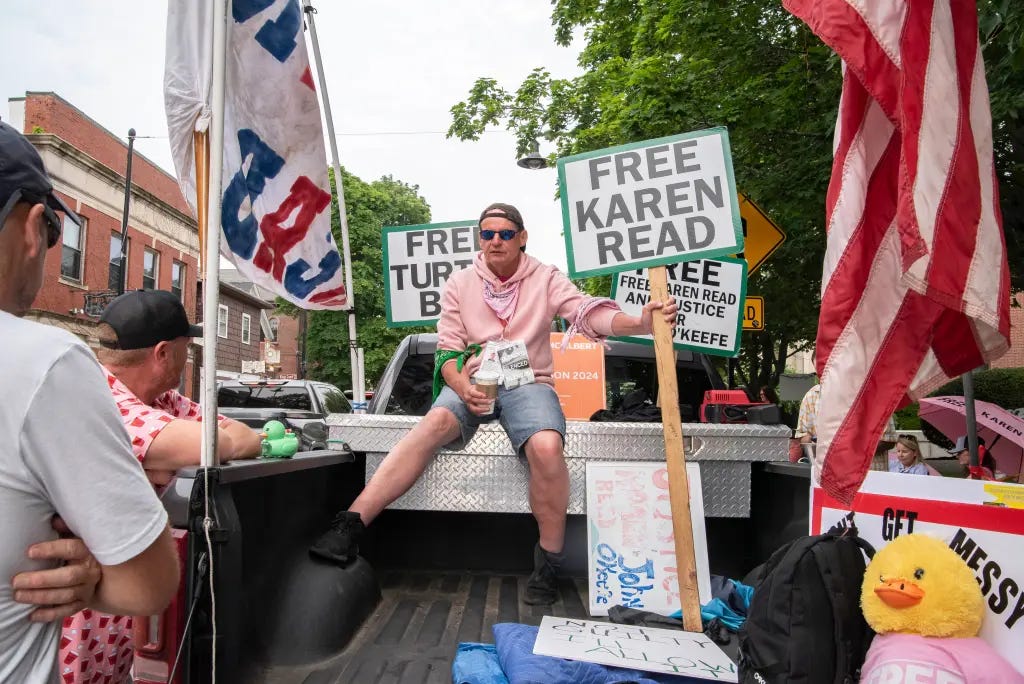Why Karen Read Could Never Happen in the U.K.
The American justice system leans toward transparency in a way that can turn cases into a circus
Why Karen Read Could Never Happen in the UK
By Jack Fox
The curtain came down in the John O’Keefe murder trial when the defendant, Karen Read, was found not guilty on the most serious charges. The frenzy that surrounded the case will now slowly ebb away.
Ms. Read’s trial morphed into a halfway house between a reality TV show and a sporting contest. For reality junkies, there was a parade of characters or caricatures, heroes and villains, serving up seemingly endless plot twists. For sports enthusiasts, you could join your tribe, cheer or jeer every development while blindly refusing to see a flaw in your own team.
Another common description was that of a circus – something staged for the public's amusement, while, at its core, real-life jeopardy unfolded.
We observed daily accounts of witness intimidation, a deluge of talking heads across all forms of media, commentators declaring Karen Read a murderer long before the not guilty verdict, and others accusing everyday citizens of Canton, Massachusetts, of killing a policeman, without any evidence.
The paramount question now that the verdicts are in is: Was the jury pool tainted by all the noise?
And watching it all here in England, I’m thinking, "That would never happen here.”
Why not?
I’ve often thought our U.K. legal systems are stuffy and old-fashioned compared to that in the U.S., but some of the rules that make it that way mean that we’d never see misinformation campaigns (or even information campaigns) happen at such a scale around an active court case.
The primary reason is contempt of court. Once a case becomes active (that is, when someone is arrested or charged), there are very strict regulations about what can be stated or reported. To all intents and purposes, that signifies that as soon as someone is charged, all detailed media coverage of the story ceases, and we won’t hear about it again until the trial commences.
The underlying principle is that everyone deserves a fair trial, and rumor, commentary, or opinion could influence a potential juror's perspective.

In days of old, this primarily affected mainstream media, but it has always applied to everyone. In these times of social media, this law is being tested. However fiercely some individuals express themselves on social media, without mainstream media to amplify the message, it never truly gains traction.
Without the oxygen of publicity and deprived of fresh updates, even the loudest voices grow weak and weary, and shift their focus to another subject.
Here in most of the U.K., the jury is simply the jury. For each jury trial, the case is assigned to a jury, and that’s it. There’s no jury selection, no attempting to stack the jury in your favor, you just accept what you’re given and proceed. It’s far simpler.
We do not have live TV or audio coverage of any court case in England and Wales. While there are laws that are common across the U.K., there are local differences in Scotland and Northern Ireland1, as well as England and Wales, which share a legal system. Scottish trials have been open to filming since 1992.2 We recently introduced live coverage of the sentencing phase for high-profile cases in England and Wales, but that is the sole exception. 3
Consequently, there’s no live streaming of trials in most the U.K. and endless discussion about who appears honest and who seems shady. It makes our court system considerably more closed off, but we will never have a "must-watch" soap opera trial like O.J. Simpson here.
We might miss out on the live action, but the vilification of witnesses such as Officer Kelly Devers or Dr Marie Russell would never happen here. Being a witness can be daunting enough without feeling the eyes of the country are on you.
Anyone can report on an ongoing trial, but the statutes are very strict about what can be reported. It has to be factual and fair. There’s no commentary permitted, no opinion, and no polls about how you would vote if you were the jury.
Given the limited coverage of a case, the jury members are among the few who have had the opportunity to hear all the evidence. It’s much harder to criticize a jury’s decision when they possess significantly more information about the trial than you do.
Finally, the jury cannot discuss what transpired in the jury room once the trial concludes. I’ve performed jury duty, but I cannot disclose what we deliberated, how we voted on the charges, how we selected a foreperson, or any other factor that contributed to our decision.
This may mean we don’t have the gossip of a jury on our news shows, but our juries are free to reach their decisions without a looming sensation that they may have to account for their verdict to those who vehemently disagree.
The outcome is that cases proceed through the English and Welsh and Northern Irish courts in a far more subdued manner than in the U.S. It’s more solemn and earnest. Less fanfare and flash.
I realize many of these principles run contrary to what is important to Americans: the First Amendment, the press holding government accountable and the notion that justice must be seen to be done. And there’s considerable weight to those arguments.
However, we treat our justice system with greater reverence and respect here in most of the U.K. The aspiration for all to receive a fair trial is at the core of these restrictions. Is it possible some of this darkness allows for flawed justice at times? Yes, it is. Are some of our concepts at risk of becoming strained in an age where everyone can be a publisher? Also, yes.
What we do create is a safe and dignified environment for our justice to unfold. One where the rights of both the victims and the accused are respected and even cherished. That means the Karen Read circus isn’t coming to our town anytime soon.
Which I think, on balance, is a good thing.
Jack Fox is the host of the YouTube channel and podcast Never a Truer Word and is an expert in Statement Analysis.
In 2024, Northern Irish courts began a pilot to test the process of broadcasting some court proceedings. The pilot was for the Court of Appeal, the highest court in Northern Ireland.
Filming is generally prohibited in Scottish courts, but exceptions can be made for specific purposes like documentary filming or reporting, with strict conditions. Broadcasters can apply for permission to film court proceedings, but this is limited and often restricted to appeal courts or high-profile cases. Livestreaming is not allowd unless authorized by the court, only and only in substantive civil appeal hearings before the First and Second Divisions of the Court of Session, which are Scotland's highest civil court.
In 2022, broadcasting of sentencing hearings in high-profile cases was allowed.







I completely agree. The justice system in the U.S. can be like a halfway house between a political spectacle and a reality show. With a sprinkling of Court TV added drama.
Thanks for this, and I also enjoy Never A Truer Word! I try to stick to the superior crime podcasts (hence I'm here), that are more educational and less sensational.
While I'm sure it's not perfect, one other thing I love about the UK system is the lack of the horrible Reid technique, which is great at getting confessions, without knowing if they are just coerced; and often it seems, not then backed up by searching for evidence to prove it either way.
While there may not be as many miscarriages of justice as people presume, many that are often come from false/coerced confessions, especially with those with who are in some way vulnerable. I remember a case where a 14-year-old boy confessed to raping and murdering his sister and it was later proven via DNA that he was innocent (can't remember the names).
The interviews I've seen of British crime for some time now involve formal interviews, posing questions that are often quite dull with 'no comment'. But the evidence is laid out to respond to. We've come a long way from the days of police beating confessions out of people over here!
I got into true crime in 1991 via a James Hanratty documentary on the BBC (controversial 1961 case), and I still like to think he's innocent, on some level, even though it seems he was indeed guilty, if the DNA tests decades later were scientifically sound given how the evidence was stored. Properly collected and stored DNA, plus better interviewing techniques, should help create fewer miscarriages of justice.